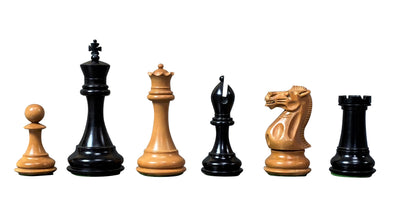The Timeless Game of Chess: A Journey Through History
Chess, often dubbed the "game of kings", boasts a rich tapestry of history that spans centuries and continents. With its origins tracing back to ancient India, chess has evolved into a global phenomenon, captivating minds of all ages. In this article, we will delve into the intriguing history of chess, exploring its roots, transformations, and the significant milestones that have marked its journey to modern times.
The Origins: Chaturanga in Ancient India
The earliest form of chess can be traced back to a game called Chaturanga, which emerged in India around the 6th century AD. This strategic board game comprised four divisions of the military: infantry, cavalry, elephants, and chariots. Chaturanga was played on an 8x8 grid, much like the chessboard we know today. Players employed military tactics, positioning their pieces to outmanoeuvre their opponent.
Chaturanga's Influence on Other Cultures
As traders and conquerors moved across borders, Chaturanga spread to various regions, evolving into different variants that were adapted to local customs and styles of play. In Persia, it transformed into Shāh Māt, or "King is Dead", which laid the groundwork for modern chess. The Persian version introduced new terms and concepts, including the distinctive names of pieces such as rook and queen.
The Islamic Golden Age and the Rise of Shāh
The arrival of Islam in Persia during the 7th century provided a fertile ground for the game to flourish. As scholars embraced chess, it became a symbol of intelligence and strategy among the elite. The game's popularity grew, and as it spread through the Islamic empire, it underwent further evolution.
Notable Chess Literature
During this era, key texts were produced, including the famous "Kitab al-Shatranj" by al-Adli, which detailed various strategies and tactics for playing chess. Scholars and writers celebrated chess not only as a game but also as an intellectual pursuit, akin to mathematics or philosophy. This period cemented the game's status as a cultured pastime, especially among nobility.
From Europe to the Modern Game: The Renaissance Influence
As trade routes expanded, chess made its way into Europe around the 9th century, particularly gaining traction in Spain and Italy. The game adapted once again, reflecting the culture and artistic movements of the Renaissance. By the 15th century, the rules of chess were formalised, leading to the gameplay style we recognise today.
Evolution of Chess Pieces and Rules
- Queen: The most significant change was empowering the queen, who transformed from a weak piece to the most powerful on the board, capable of moving any number of squares in any direction.
- Bishop: The bishop gained the ability to move diagonally across the board, which was a shift from its previous limited movement.
- Checkmate and Draw Rules: The concept of checkmate was revised, where the game must end when the king is threatened with capture, alongside establishing clear rules regarding draws and stalemates.
The Birth of Modern Chess
Chess evolved dramatically in the 19th century, transitioning from a genteel pastime to a competitive sport. The first official World Chess Championship occurred in 1886, pitting Wilhelm Steinitz against Johannes Zukertort. This event marked the start of a new era, characterised by an increasing interest in tournaments and international competitions.
The Development of Chess Organisations
The establishment of organisations such as the Fédération Internationale des Échecs (FIDE) in 1924 was pivotal in standardising rules and overseeing international competitions. FIDE's role in chess promotion helped popularise the game further, culminating in a series of world championships that would showcase the talents of the best players across generations.
Chess in the 20th Century: Innovation and Technology
As the world plunged into the tumult of the 20th century, chess emerged as a battlefield for ideological supremacy, particularly during the Cold War. The iconic matches between American Bobby Fischer and Soviet champion Boris Spassky captured the attention of millions, elevating chess into the cultural limelight.
The Impact of Computers and Online Chess
With the rapid advancement of technology, chess underwent yet another transformation. Computers began to play a significant role in chess, starting with IBM's Deep Blue defeating world champion Garry Kasparov in 1997. This historic match propelled discussions about artificial intelligence and its potential in strategic games.
The Rise of Online Chess and Its Global Appeal
The rise of the internet has revolutionised the game, making it accessible to a wider audience. Platforms like Chess.com and Lichess have exploded in popularity, allowing players from all over the globe to compete against each other regardless of location. With the rise of online play, streaming platforms have also enabled grandmasters to reach larger audiences, showcasing top-tier play through Twitch and YouTube.
The Role of Social Media and Online Communities
In recent years, chess has thrived on platforms like TikTok and Twitter, where players share strategies, hilarious moments, and educational content. This cross-generational appeal allows new players to delve into the game and learn from those with years of experience. The community surrounding online chess fosters a unique blend of learning, sharing, and competition that enhances the love for the game.
Chess: A Game for the Future
As we look forward, chess continues to evolve and adapt. Innovations such as chess engines and analysis software have changed how players study and prepare for games, allowing for deeper strategic insights. Furthermore, the game's inclusion in educational programmes worldwide showcases its value in developing critical thinking and problem-solving skills.
Chess and Inclusivity
In the 21st century, efforts to promote inclusivity in chess are reshaping the landscape of the game. Various initiatives aim to engage underrepresented groups, including women and minorities, by providing resources and platforms to foster interest and participation. The success of female champions such as Judit Polgar and Hou Yifan ignites inspiration for future generations.
Embarking on Your Own Chess Journey
Whether you are a seasoned player or just beginning to explore the world of chess, the game's rich history is a shining testament to its enduring appeal. With each match played, you are not only engaging in a timeless battle of wits but also becoming a part of a lineage that dates back to ancient times.
Steps to Get Started with Chess
- Learn the Rules: Familiarise yourself with the basic rules and movements of each piece.
- Practice Regularly: Play against friends, family, or online opponents to develop your skills and understanding of the game.
- Study Strategies: Read books, watch videos, and analyse famous matches to improve your strategic thinking.
- Join a Community: Engage with local chess clubs or online forums to connect with fellow enthusiasts.
The Legacy of Chess: More Than Just a Game
As we embrace the future of chess, we celebrate not just a game, but a cultural phenomenon that bridges divides, fosters intellect and creativity, and brings people together. Each move on the board echoes the strategies of countless minds, each match tells a story of battles fought in silence, longing for victory. These elements make chess much more than just a pastime; they weave a legacy of thought, culture, and community that will continue to thrive for generations to come.









